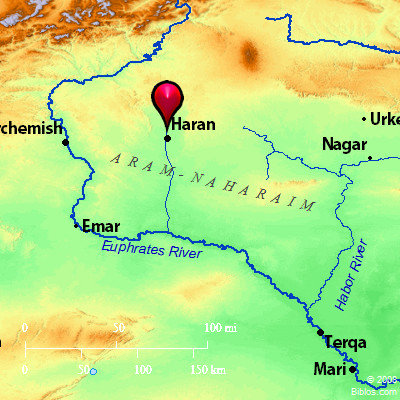Atlas  Haran and surrounding area Maps Created using Biblemapper 3.0 Additional data from OpenBible.info Occurrences Genesis 11:31 Terah took Abram his son, Lot the son of Haran, his son's son, and Sarai his daughter-in-law, his son Abram's wife. They went forth from Ur of the Chaldees, to go into the land of Canaan. They came to Haran and lived there.Genesis 11:32 The days of Terah were two hundred five years. Terah died in Haran. Genesis 12:4 So Abram went, as Yahweh had spoken to him. Lot went with him. Abram was seventy-five years old when he departed out of Haran. Genesis 12:5 Abram took Sarai his wife, Lot his brother's son, all their substance that they had gathered, and the souls whom they had gotten in Haran, and they went forth to go into the land of Canaan. Into the land of Canaan they came. Genesis 27:43 Now therefore, my son, obey my voice. Arise, flee to Laban, my brother, in Haran. Genesis 28:10 Jacob went out from Beersheba, and went toward Haran. 2 Kings 19:12 Have the gods of the nations delivered them, which my fathers have destroyed, Gozan, and Haran, and Rezeph, and the children of Eden that were in Telassar? Isaiah 37:12 Have the gods of the nations delivered them, which my fathers have destroyed, Gozan, Haran, Rezeph, and the children of Eden who were in Telassar? Ezekiel 27:23 Haran and Canneh and Eden, the traffickers of Sheba, Asshur and Chilmad, were your traffickers. Acts 7:2 He said, "Brothers and fathers, listen. The God of glory appeared to our father Abraham, when he was in Mesopotamia, before he lived in Haran, Acts 7:4 Then he came out of the land of the Chaldaeans, and lived in Haran. From there, when his father was dead, God moved him into this land, where you are now living. Encyclopedia HARAN (2)ha'-ran (charan; Charhran): The city where Terah settled on his departure from Ur (Genesis 11:31 f); whence Abram set out on his pilgrimage of faith to Canaan (Genesis 12:1). It was probably "the city of Nahor" to which Abraham's servant came to find a wife for Isaac (Genesis 24:10). Hither came Jacob when he fled from Esau's anger (Genesis 27:43). Here he met his bride (Genesis 29:4), and in the neighboring pastures he tended the flocks of Laban. It is one of the cities named by Rabshakeh as destroyed by the king of Assyria (2 Kings 19:12 Isaiah 37:12). Ezekiel speaks of the merchants of Haran as trading with Tyre (27:23). HA'RAN, Gen, 11:31, 32 and eight other places are very probably the present Harran about 430 ms. n.w. from Babylon, on a small stream running s. to the Euphrates 70 ms, distant. It contains the traditional tomb of Terah and is a small village. Same as Char'-ran of Acts 7:2. Strong's Greek G5488: CharranHaran, a city in northwest Mesopotamia |



